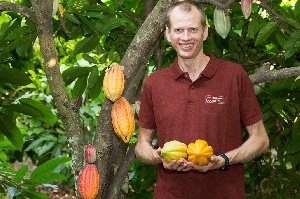The world needs forests. They are vital to maintain biodiversity and to help combat climate change.
At the same time, forests have suffered since the invention of the plough, as people have cut them down to plant crops for food and cash. The bulldozer just made things worse.
Over 70% of the world’s cocoa comes from Côte d’Ivoire and Ghana, and deforestation has wreaked havoc. Only 17% of the original forest remains in Côte d’Ivoire, while only fragments of the once magnificent Guinean forest can still be found.
How did this happen, and is cocoa to blame? If so, what is Nestlé and the industry doing about it?
Cocoa from protected forests has no place in our supply chain. We’re working to stop deforestation and the destruction of other natural habits within cocoa, and across our supply chains. We’ve committed to achieving 100% deforestation-free commodities by 2020.
Planting cocoa, alongside other commodity crops and logging, has caused deforestation. However, because it ends up in chocolate, an iconic product, cocoa-related deforestation attracts a lot of attention.
Restoring forest areas
I welcome the media spotlight on cocoa, because it highlights deforestation as a pressing issue for our cocoa sector, but also for West Africa as a whole. While we should work towards stopping cocoa plantations expanding into forests, we need to protect them from all agricultural encroachments.
Addressing deforestation is complex, and given that cocoa is mainly a smallholder crop in West Africa, we must consider farmer’s livelihoods. This is the shared responsibility of all stakeholders, cocoa and chocolate industry, governments of producing countries, cooperatives, farmers and rural communities.
Thirty-three leading cocoa and chocolate-producing companies (World Cocoa Foundation members), have come together with the governments of Côte d’Ivoire and Ghana to sign the Cocoa and Forests Initiative (CFI) Frameworks for Action to end deforestation and restore forest areas. Full marks to everyone for pulling together to achieve this. Special mention goes to The Prince of Wales for the initiation and NGO Mighty Earth for making sure it happened.
When taking action, nothing is easy. In Côte d’Ivoire and Ghana, people have lived and worked in the forests for decades, and cannot just be moved on. We need to protect the forests while supporting sustainable livelihoods, by growing ‘more cocoa on less land’.
What is Nestlé doing?
What will we do as Nestlé within the CFI framework? Our actions focus on our Nestlé Cocoa Plan supply chain, through which we have forged relationships with smallholders to ensure responsibly sourced cocoa by working under three pillars – Better farming, Better lives, Better cocoa.
Firstly, we are mapping field outlines for all the farmers – about 85,000 across Côte d’Ivoire and Ghana. We estimate that means walking 102,000km – that’s a lot of legwork!
Secondly, we are distributing over 2.6 million forest tree seedlings to farmers over the next four years, as we encourage them to grow forest trees alongside cocoa.
Thirdly, we will work with an NGO to try some agroforestry experiments – growing cocoa with a much higher density of forest trees, in areas where the government wants to reforest degraded areas.
Finally, and this might surprise some people, we’re working with one of our suppliers to provide farmers with 5,000 improved wood-burning cookstoves.
These burn better, use less fuel and produce less smoke. This reduces pressure on the forest, improves people’s health and reduces child labor – given that farming families often use children to collect wood. Sounds like a no brainer, right?
Success here will depend on local acceptance and adoption of this new technology.
The world needs forests, and cocoa is part of the rich biodiversity they support.
Hundreds of thousands of livelihoods depend on cocoa cultivation.
The Cocoa and Forests Initiative has enabled all stakeholders to define a shared vision, where sustainable cocoa production balances the need to protect the environment and the socio-economic development of cocoa farmers and of Ghana and Côte d’Ivoire.
I truly believe that we can find the right balance between protecting the forests, growing cocoa sustainably and helping the farmers. We have published our plan [link to Narrative] and we will strive to make it happen. We will continue to work together with our peers, NGOs, governments and civil society to achieve this goal and our zero deforestation commitment.
Look out for further updates!
Darrell High, Head of Nestlé Cocoa Plan
Business News of Friday, 22 March 2019
Source: Nestle Ghana Ltd













